Legal Responsibilities in Corporations and Business Structures Report
VerifiedAdded on 2022/08/27
|11
|2715
|19
Report
AI Summary
This report examines the legal duties of directors, officers, and partners within corporations and business partnerships, focusing on the Corporations Act 2001 and the Partnership Act 1963. The analysis centers around a case study involving a commercial building, a locksmith business, and a wholesale business, exploring the responsibilities of the individuals involved, including directors Sam and Rosa Tippin, manager Phillipa, and partners Charlotte and Mia. It identifies potential breaches of fiduciary duties such as the duty of care, good faith, and avoidance of conflicts of interest, referencing relevant case law like ASIC v Cassimatis, Greenhalgh v Arderne Cinemas Ltd, and others. Furthermore, the report assesses the consequences of these breaches, including liabilities for insolvent trading and debts, while also considering breaches of partnership duties. Finally, the report highlights the steps that could have been taken to address these legal responsibilities, providing a comprehensive overview of the legal implications in the given scenario.
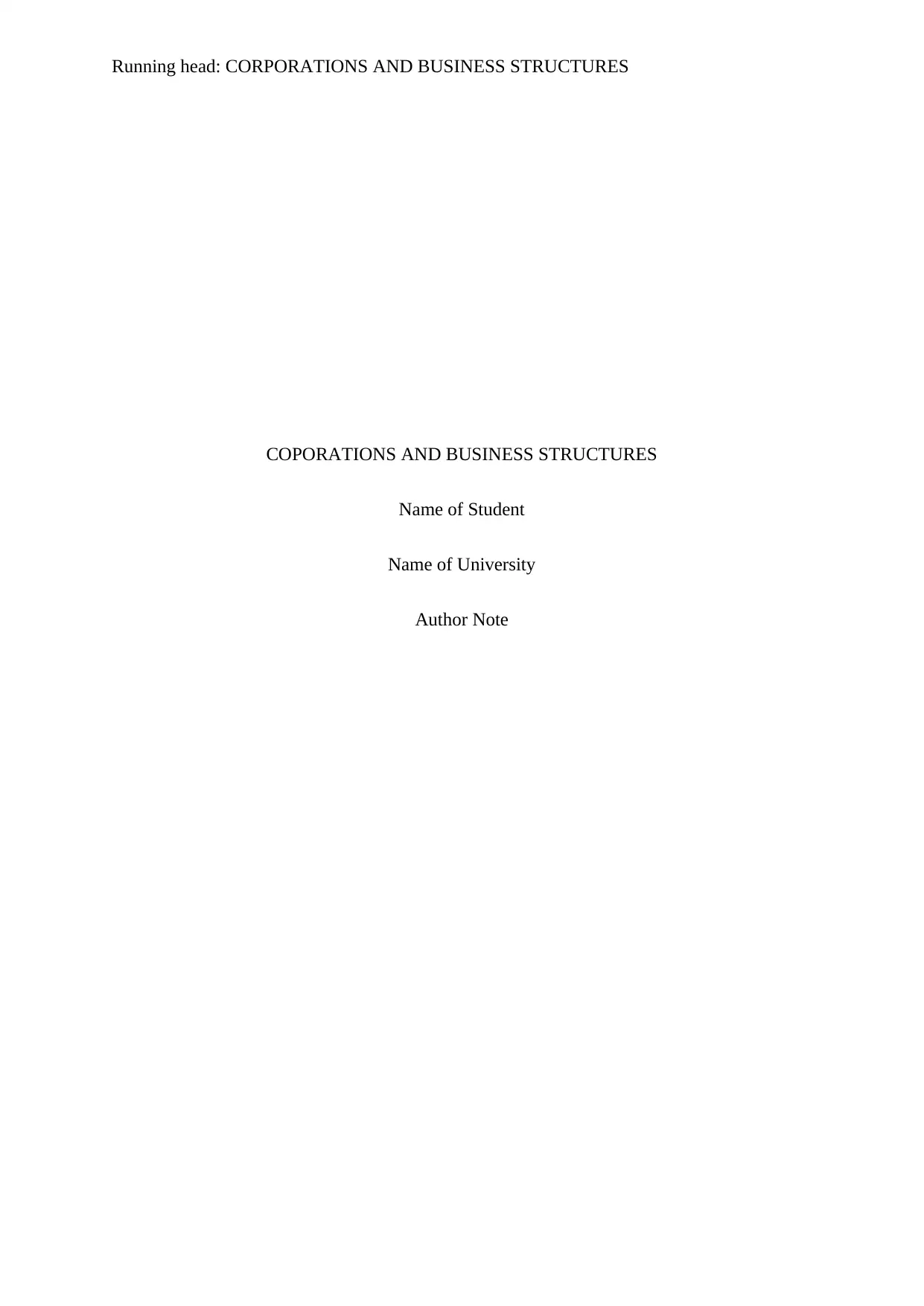
Running head: CORPORATIONS AND BUSINESS STRUCTURES
COPORATIONS AND BUSINESS STRUCTURES
Name of Student
Name of University
Author Note
COPORATIONS AND BUSINESS STRUCTURES
Name of Student
Name of University
Author Note
Paraphrase This Document
Need a fresh take? Get an instant paraphrase of this document with our AI Paraphraser
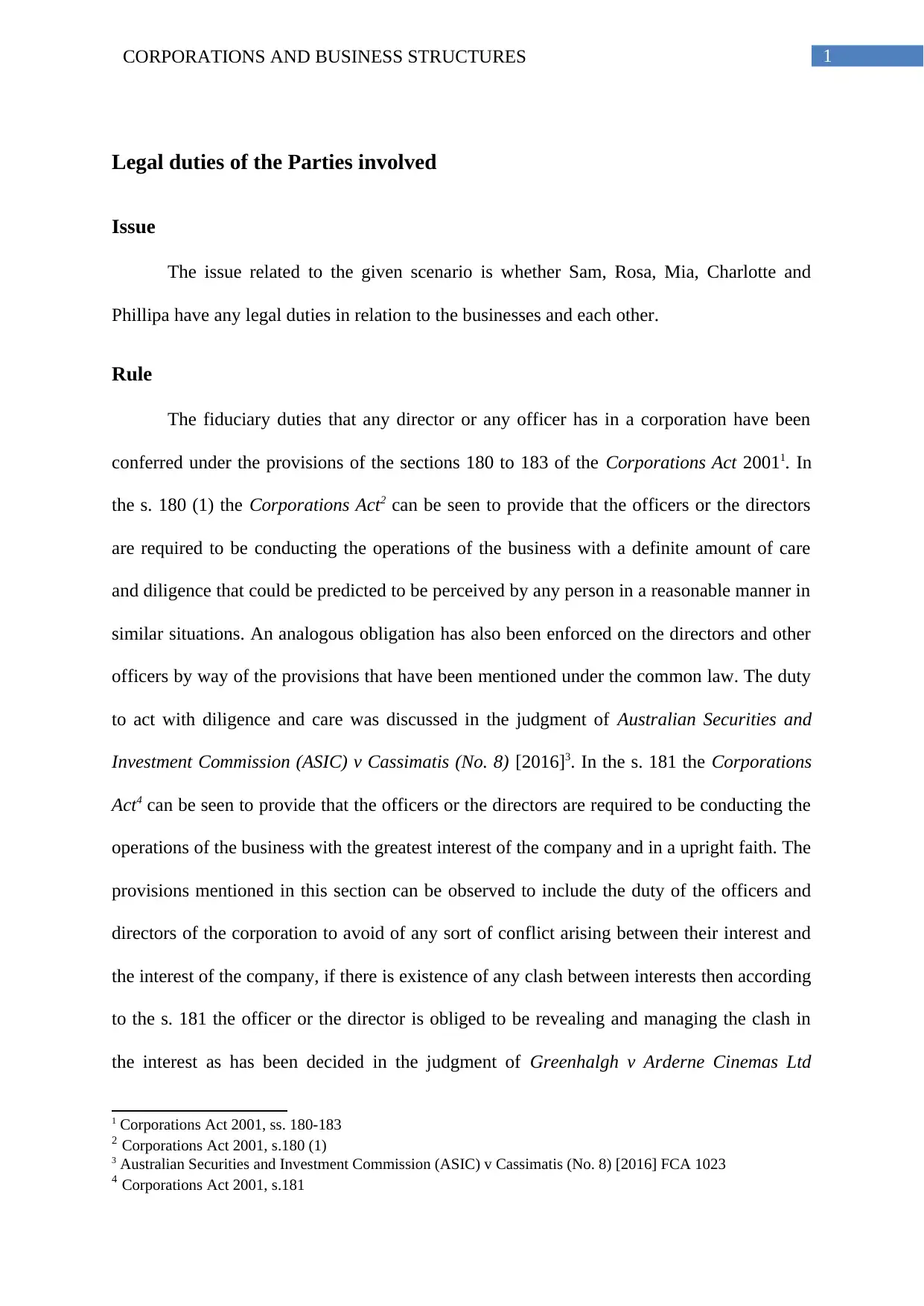
1CORPORATIONS AND BUSINESS STRUCTURES
Legal duties of the Parties involved
Issue
The issue related to the given scenario is whether Sam, Rosa, Mia, Charlotte and
Phillipa have any legal duties in relation to the businesses and each other.
Rule
The fiduciary duties that any director or any officer has in a corporation have been
conferred under the provisions of the sections 180 to 183 of the Corporations Act 20011. In
the s. 180 (1) the Corporations Act2 can be seen to provide that the officers or the directors
are required to be conducting the operations of the business with a definite amount of care
and diligence that could be predicted to be perceived by any person in a reasonable manner in
similar situations. An analogous obligation has also been enforced on the directors and other
officers by way of the provisions that have been mentioned under the common law. The duty
to act with diligence and care was discussed in the judgment of Australian Securities and
Investment Commission (ASIC) v Cassimatis (No. 8) [2016]3. In the s. 181 the Corporations
Act4 can be seen to provide that the officers or the directors are required to be conducting the
operations of the business with the greatest interest of the company and in a upright faith. The
provisions mentioned in this section can be observed to include the duty of the officers and
directors of the corporation to avoid of any sort of conflict arising between their interest and
the interest of the company, if there is existence of any clash between interests then according
to the s. 181 the officer or the director is obliged to be revealing and managing the clash in
the interest as has been decided in the judgment of Greenhalgh v Arderne Cinemas Ltd
1 Corporations Act 2001, ss. 180-183
2 Corporations Act 2001, s.180 (1)
3 Australian Securities and Investment Commission (ASIC) v Cassimatis (No. 8) [2016] FCA 1023
4 Corporations Act 2001, s.181
Legal duties of the Parties involved
Issue
The issue related to the given scenario is whether Sam, Rosa, Mia, Charlotte and
Phillipa have any legal duties in relation to the businesses and each other.
Rule
The fiduciary duties that any director or any officer has in a corporation have been
conferred under the provisions of the sections 180 to 183 of the Corporations Act 20011. In
the s. 180 (1) the Corporations Act2 can be seen to provide that the officers or the directors
are required to be conducting the operations of the business with a definite amount of care
and diligence that could be predicted to be perceived by any person in a reasonable manner in
similar situations. An analogous obligation has also been enforced on the directors and other
officers by way of the provisions that have been mentioned under the common law. The duty
to act with diligence and care was discussed in the judgment of Australian Securities and
Investment Commission (ASIC) v Cassimatis (No. 8) [2016]3. In the s. 181 the Corporations
Act4 can be seen to provide that the officers or the directors are required to be conducting the
operations of the business with the greatest interest of the company and in a upright faith. The
provisions mentioned in this section can be observed to include the duty of the officers and
directors of the corporation to avoid of any sort of conflict arising between their interest and
the interest of the company, if there is existence of any clash between interests then according
to the s. 181 the officer or the director is obliged to be revealing and managing the clash in
the interest as has been decided in the judgment of Greenhalgh v Arderne Cinemas Ltd
1 Corporations Act 2001, ss. 180-183
2 Corporations Act 2001, s.180 (1)
3 Australian Securities and Investment Commission (ASIC) v Cassimatis (No. 8) [2016] FCA 1023
4 Corporations Act 2001, s.181
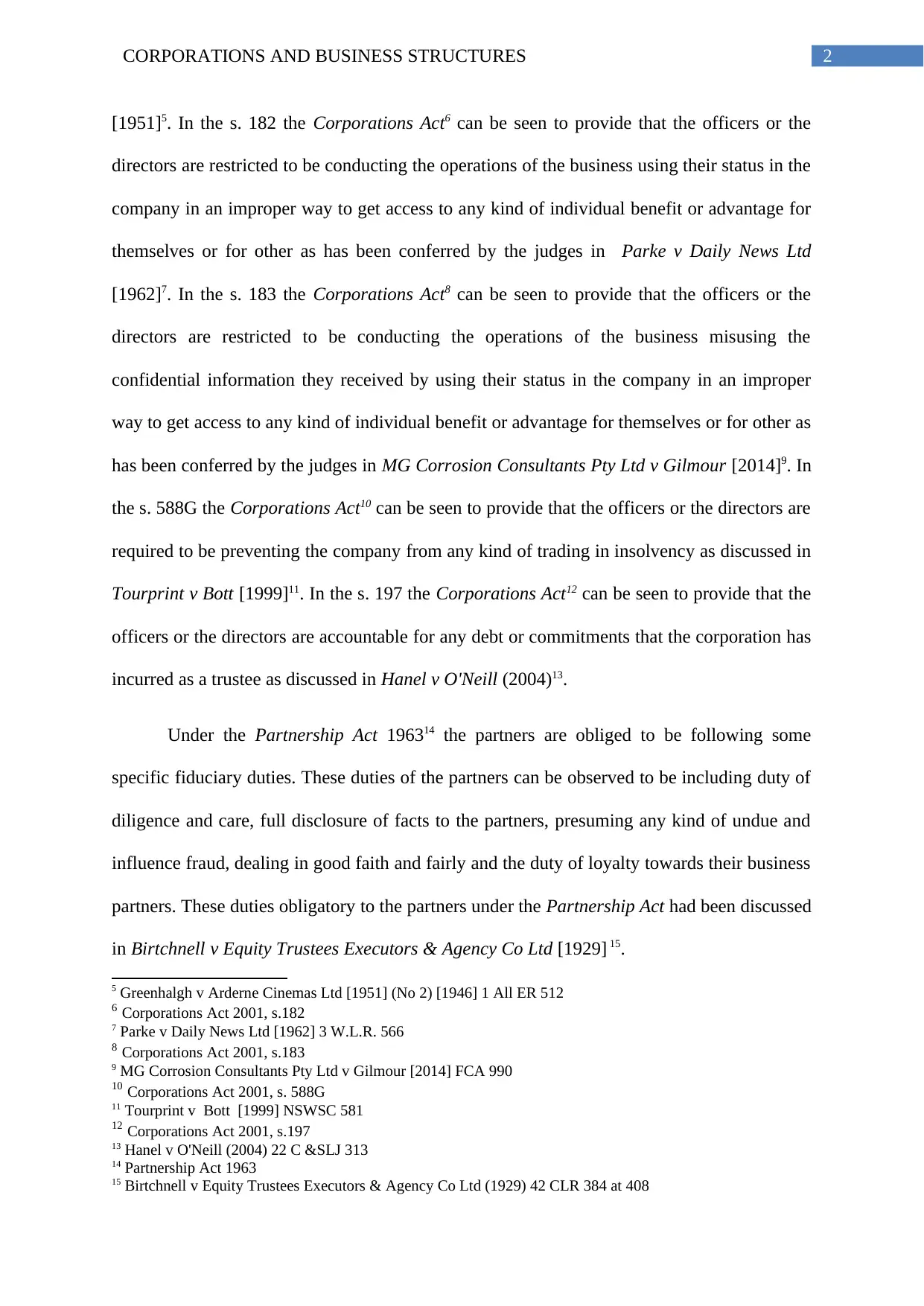
2CORPORATIONS AND BUSINESS STRUCTURES
[1951]5. In the s. 182 the Corporations Act6 can be seen to provide that the officers or the
directors are restricted to be conducting the operations of the business using their status in the
company in an improper way to get access to any kind of individual benefit or advantage for
themselves or for other as has been conferred by the judges in Parke v Daily News Ltd
[1962]7. In the s. 183 the Corporations Act8 can be seen to provide that the officers or the
directors are restricted to be conducting the operations of the business misusing the
confidential information they received by using their status in the company in an improper
way to get access to any kind of individual benefit or advantage for themselves or for other as
has been conferred by the judges in MG Corrosion Consultants Pty Ltd v Gilmour [2014]9. In
the s. 588G the Corporations Act10 can be seen to provide that the officers or the directors are
required to be preventing the company from any kind of trading in insolvency as discussed in
Tourprint v Bott [1999]11. In the s. 197 the Corporations Act12 can be seen to provide that the
officers or the directors are accountable for any debt or commitments that the corporation has
incurred as a trustee as discussed in Hanel v O'Neill (2004)13.
Under the Partnership Act 196314 the partners are obliged to be following some
specific fiduciary duties. These duties of the partners can be observed to be including duty of
diligence and care, full disclosure of facts to the partners, presuming any kind of undue and
influence fraud, dealing in good faith and fairly and the duty of loyalty towards their business
partners. These duties obligatory to the partners under the Partnership Act had been discussed
in Birtchnell v Equity Trustees Executors & Agency Co Ltd [1929] 15.
5 Greenhalgh v Arderne Cinemas Ltd [1951] (No 2) [1946] 1 All ER 512
6 Corporations Act 2001, s.182
7 Parke v Daily News Ltd [1962] 3 W.L.R. 566
8 Corporations Act 2001, s.183
9 MG Corrosion Consultants Pty Ltd v Gilmour [2014] FCA 990
10 Corporations Act 2001, s. 588G
11 Tourprint v Bott [1999] NSWSC 581
12 Corporations Act 2001, s.197
13 Hanel v O'Neill (2004) 22 C &SLJ 313
14 Partnership Act 1963
15 Birtchnell v Equity Trustees Executors & Agency Co Ltd (1929) 42 CLR 384 at 408
[1951]5. In the s. 182 the Corporations Act6 can be seen to provide that the officers or the
directors are restricted to be conducting the operations of the business using their status in the
company in an improper way to get access to any kind of individual benefit or advantage for
themselves or for other as has been conferred by the judges in Parke v Daily News Ltd
[1962]7. In the s. 183 the Corporations Act8 can be seen to provide that the officers or the
directors are restricted to be conducting the operations of the business misusing the
confidential information they received by using their status in the company in an improper
way to get access to any kind of individual benefit or advantage for themselves or for other as
has been conferred by the judges in MG Corrosion Consultants Pty Ltd v Gilmour [2014]9. In
the s. 588G the Corporations Act10 can be seen to provide that the officers or the directors are
required to be preventing the company from any kind of trading in insolvency as discussed in
Tourprint v Bott [1999]11. In the s. 197 the Corporations Act12 can be seen to provide that the
officers or the directors are accountable for any debt or commitments that the corporation has
incurred as a trustee as discussed in Hanel v O'Neill (2004)13.
Under the Partnership Act 196314 the partners are obliged to be following some
specific fiduciary duties. These duties of the partners can be observed to be including duty of
diligence and care, full disclosure of facts to the partners, presuming any kind of undue and
influence fraud, dealing in good faith and fairly and the duty of loyalty towards their business
partners. These duties obligatory to the partners under the Partnership Act had been discussed
in Birtchnell v Equity Trustees Executors & Agency Co Ltd [1929] 15.
5 Greenhalgh v Arderne Cinemas Ltd [1951] (No 2) [1946] 1 All ER 512
6 Corporations Act 2001, s.182
7 Parke v Daily News Ltd [1962] 3 W.L.R. 566
8 Corporations Act 2001, s.183
9 MG Corrosion Consultants Pty Ltd v Gilmour [2014] FCA 990
10 Corporations Act 2001, s. 588G
11 Tourprint v Bott [1999] NSWSC 581
12 Corporations Act 2001, s.197
13 Hanel v O'Neill (2004) 22 C &SLJ 313
14 Partnership Act 1963
15 Birtchnell v Equity Trustees Executors & Agency Co Ltd (1929) 42 CLR 384 at 408
⊘ This is a preview!⊘
Do you want full access?
Subscribe today to unlock all pages.

Trusted by 1+ million students worldwide
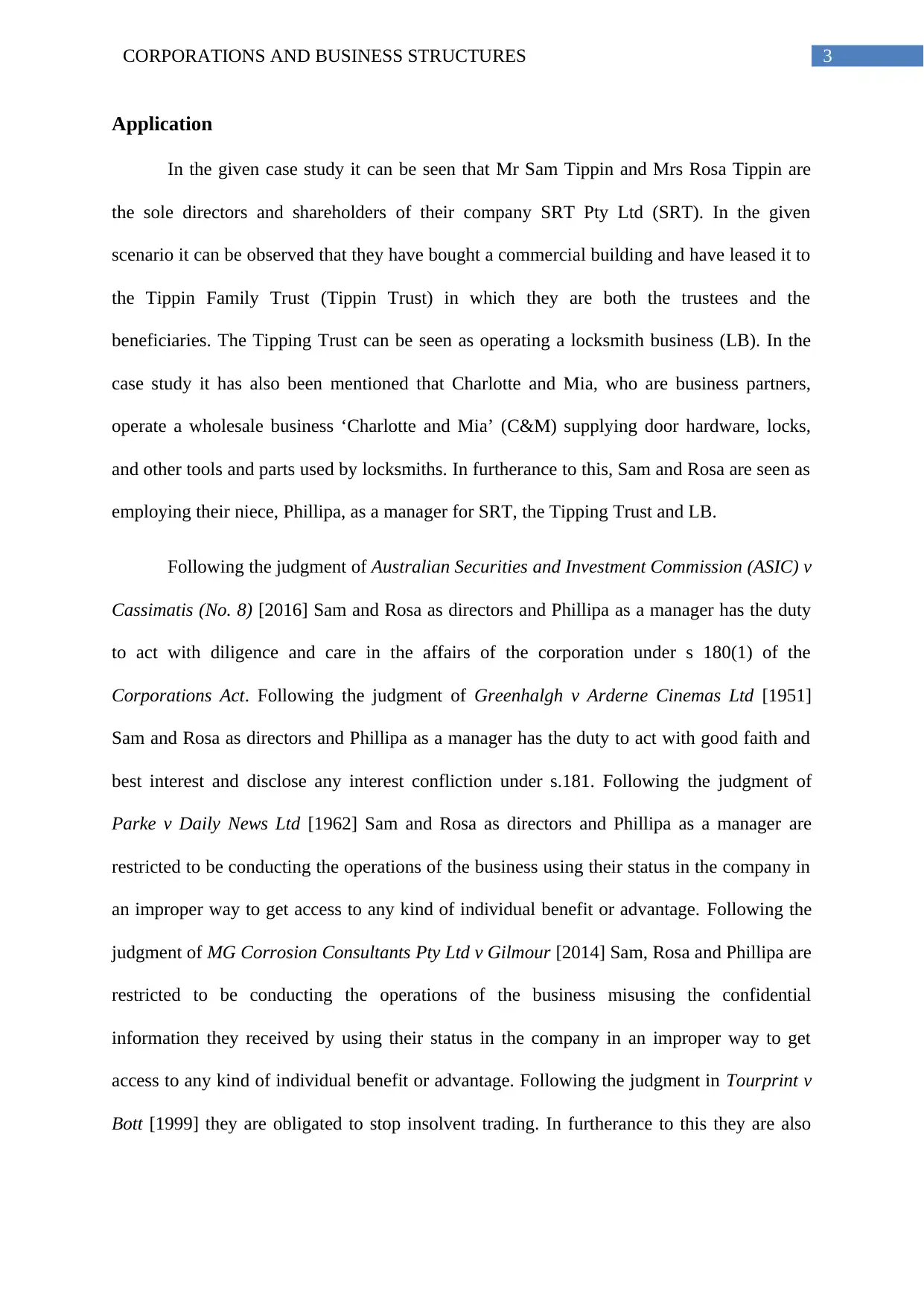
3CORPORATIONS AND BUSINESS STRUCTURES
Application
In the given case study it can be seen that Mr Sam Tippin and Mrs Rosa Tippin are
the sole directors and shareholders of their company SRT Pty Ltd (SRT). In the given
scenario it can be observed that they have bought a commercial building and have leased it to
the Tippin Family Trust (Tippin Trust) in which they are both the trustees and the
beneficiaries. The Tipping Trust can be seen as operating a locksmith business (LB). In the
case study it has also been mentioned that Charlotte and Mia, who are business partners,
operate a wholesale business ‘Charlotte and Mia’ (C&M) supplying door hardware, locks,
and other tools and parts used by locksmiths. In furtherance to this, Sam and Rosa are seen as
employing their niece, Phillipa, as a manager for SRT, the Tipping Trust and LB.
Following the judgment of Australian Securities and Investment Commission (ASIC) v
Cassimatis (No. 8) [2016] Sam and Rosa as directors and Phillipa as a manager has the duty
to act with diligence and care in the affairs of the corporation under s 180(1) of the
Corporations Act. Following the judgment of Greenhalgh v Arderne Cinemas Ltd [1951]
Sam and Rosa as directors and Phillipa as a manager has the duty to act with good faith and
best interest and disclose any interest confliction under s.181. Following the judgment of
Parke v Daily News Ltd [1962] Sam and Rosa as directors and Phillipa as a manager are
restricted to be conducting the operations of the business using their status in the company in
an improper way to get access to any kind of individual benefit or advantage. Following the
judgment of MG Corrosion Consultants Pty Ltd v Gilmour [2014] Sam, Rosa and Phillipa are
restricted to be conducting the operations of the business misusing the confidential
information they received by using their status in the company in an improper way to get
access to any kind of individual benefit or advantage. Following the judgment in Tourprint v
Bott [1999] they are obligated to stop insolvent trading. In furtherance to this they are also
Application
In the given case study it can be seen that Mr Sam Tippin and Mrs Rosa Tippin are
the sole directors and shareholders of their company SRT Pty Ltd (SRT). In the given
scenario it can be observed that they have bought a commercial building and have leased it to
the Tippin Family Trust (Tippin Trust) in which they are both the trustees and the
beneficiaries. The Tipping Trust can be seen as operating a locksmith business (LB). In the
case study it has also been mentioned that Charlotte and Mia, who are business partners,
operate a wholesale business ‘Charlotte and Mia’ (C&M) supplying door hardware, locks,
and other tools and parts used by locksmiths. In furtherance to this, Sam and Rosa are seen as
employing their niece, Phillipa, as a manager for SRT, the Tipping Trust and LB.
Following the judgment of Australian Securities and Investment Commission (ASIC) v
Cassimatis (No. 8) [2016] Sam and Rosa as directors and Phillipa as a manager has the duty
to act with diligence and care in the affairs of the corporation under s 180(1) of the
Corporations Act. Following the judgment of Greenhalgh v Arderne Cinemas Ltd [1951]
Sam and Rosa as directors and Phillipa as a manager has the duty to act with good faith and
best interest and disclose any interest confliction under s.181. Following the judgment of
Parke v Daily News Ltd [1962] Sam and Rosa as directors and Phillipa as a manager are
restricted to be conducting the operations of the business using their status in the company in
an improper way to get access to any kind of individual benefit or advantage. Following the
judgment of MG Corrosion Consultants Pty Ltd v Gilmour [2014] Sam, Rosa and Phillipa are
restricted to be conducting the operations of the business misusing the confidential
information they received by using their status in the company in an improper way to get
access to any kind of individual benefit or advantage. Following the judgment in Tourprint v
Bott [1999] they are obligated to stop insolvent trading. In furtherance to this they are also
Paraphrase This Document
Need a fresh take? Get an instant paraphrase of this document with our AI Paraphraser
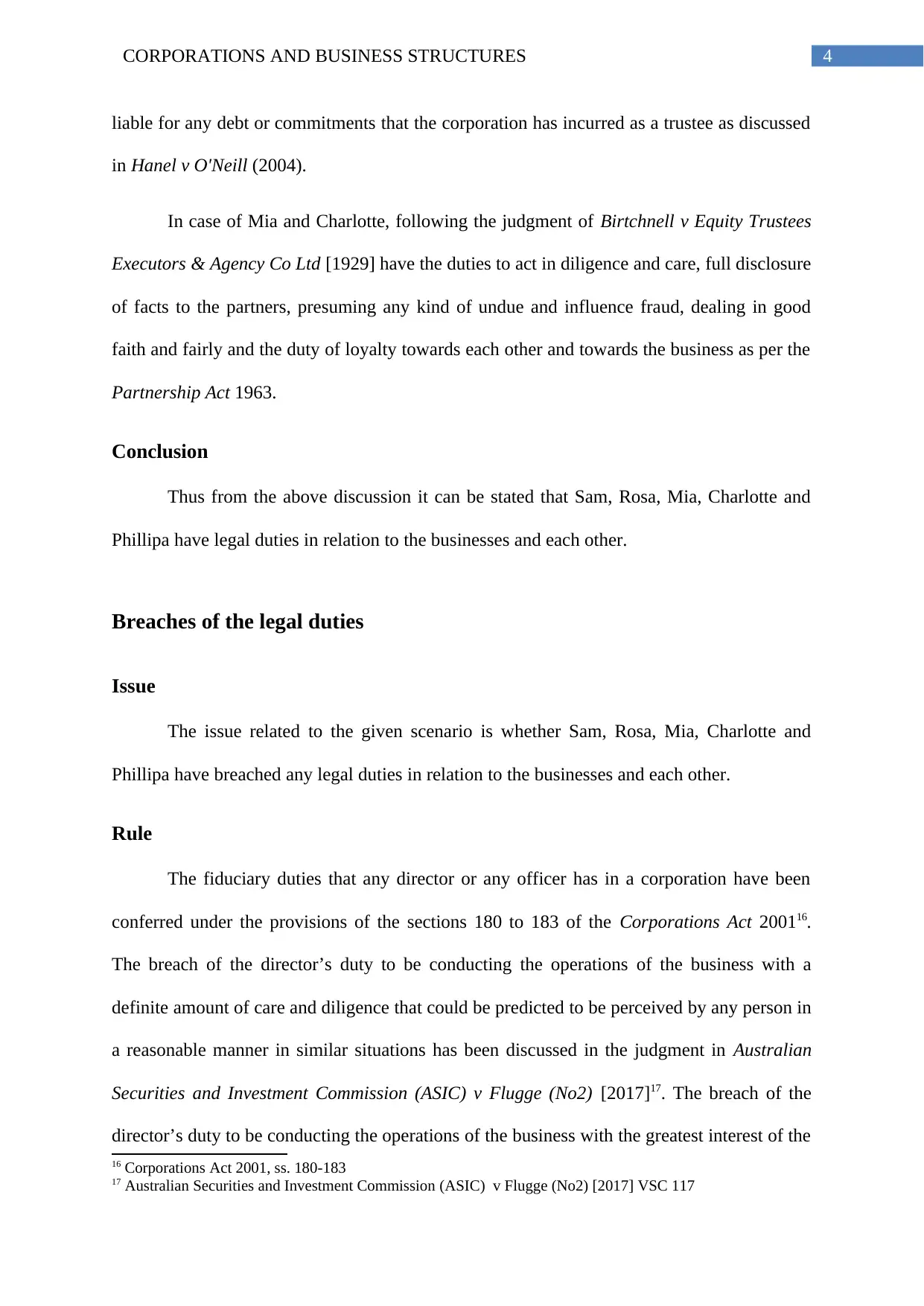
4CORPORATIONS AND BUSINESS STRUCTURES
liable for any debt or commitments that the corporation has incurred as a trustee as discussed
in Hanel v O'Neill (2004).
In case of Mia and Charlotte, following the judgment of Birtchnell v Equity Trustees
Executors & Agency Co Ltd [1929] have the duties to act in diligence and care, full disclosure
of facts to the partners, presuming any kind of undue and influence fraud, dealing in good
faith and fairly and the duty of loyalty towards each other and towards the business as per the
Partnership Act 1963.
Conclusion
Thus from the above discussion it can be stated that Sam, Rosa, Mia, Charlotte and
Phillipa have legal duties in relation to the businesses and each other.
Breaches of the legal duties
Issue
The issue related to the given scenario is whether Sam, Rosa, Mia, Charlotte and
Phillipa have breached any legal duties in relation to the businesses and each other.
Rule
The fiduciary duties that any director or any officer has in a corporation have been
conferred under the provisions of the sections 180 to 183 of the Corporations Act 200116.
The breach of the director’s duty to be conducting the operations of the business with a
definite amount of care and diligence that could be predicted to be perceived by any person in
a reasonable manner in similar situations has been discussed in the judgment in Australian
Securities and Investment Commission (ASIC) v Flugge (No2) [2017]17. The breach of the
director’s duty to be conducting the operations of the business with the greatest interest of the
16 Corporations Act 2001, ss. 180-183
17 Australian Securities and Investment Commission (ASIC) v Flugge (No2) [2017] VSC 117
liable for any debt or commitments that the corporation has incurred as a trustee as discussed
in Hanel v O'Neill (2004).
In case of Mia and Charlotte, following the judgment of Birtchnell v Equity Trustees
Executors & Agency Co Ltd [1929] have the duties to act in diligence and care, full disclosure
of facts to the partners, presuming any kind of undue and influence fraud, dealing in good
faith and fairly and the duty of loyalty towards each other and towards the business as per the
Partnership Act 1963.
Conclusion
Thus from the above discussion it can be stated that Sam, Rosa, Mia, Charlotte and
Phillipa have legal duties in relation to the businesses and each other.
Breaches of the legal duties
Issue
The issue related to the given scenario is whether Sam, Rosa, Mia, Charlotte and
Phillipa have breached any legal duties in relation to the businesses and each other.
Rule
The fiduciary duties that any director or any officer has in a corporation have been
conferred under the provisions of the sections 180 to 183 of the Corporations Act 200116.
The breach of the director’s duty to be conducting the operations of the business with a
definite amount of care and diligence that could be predicted to be perceived by any person in
a reasonable manner in similar situations has been discussed in the judgment in Australian
Securities and Investment Commission (ASIC) v Flugge (No2) [2017]17. The breach of the
director’s duty to be conducting the operations of the business with the greatest interest of the
16 Corporations Act 2001, ss. 180-183
17 Australian Securities and Investment Commission (ASIC) v Flugge (No2) [2017] VSC 117
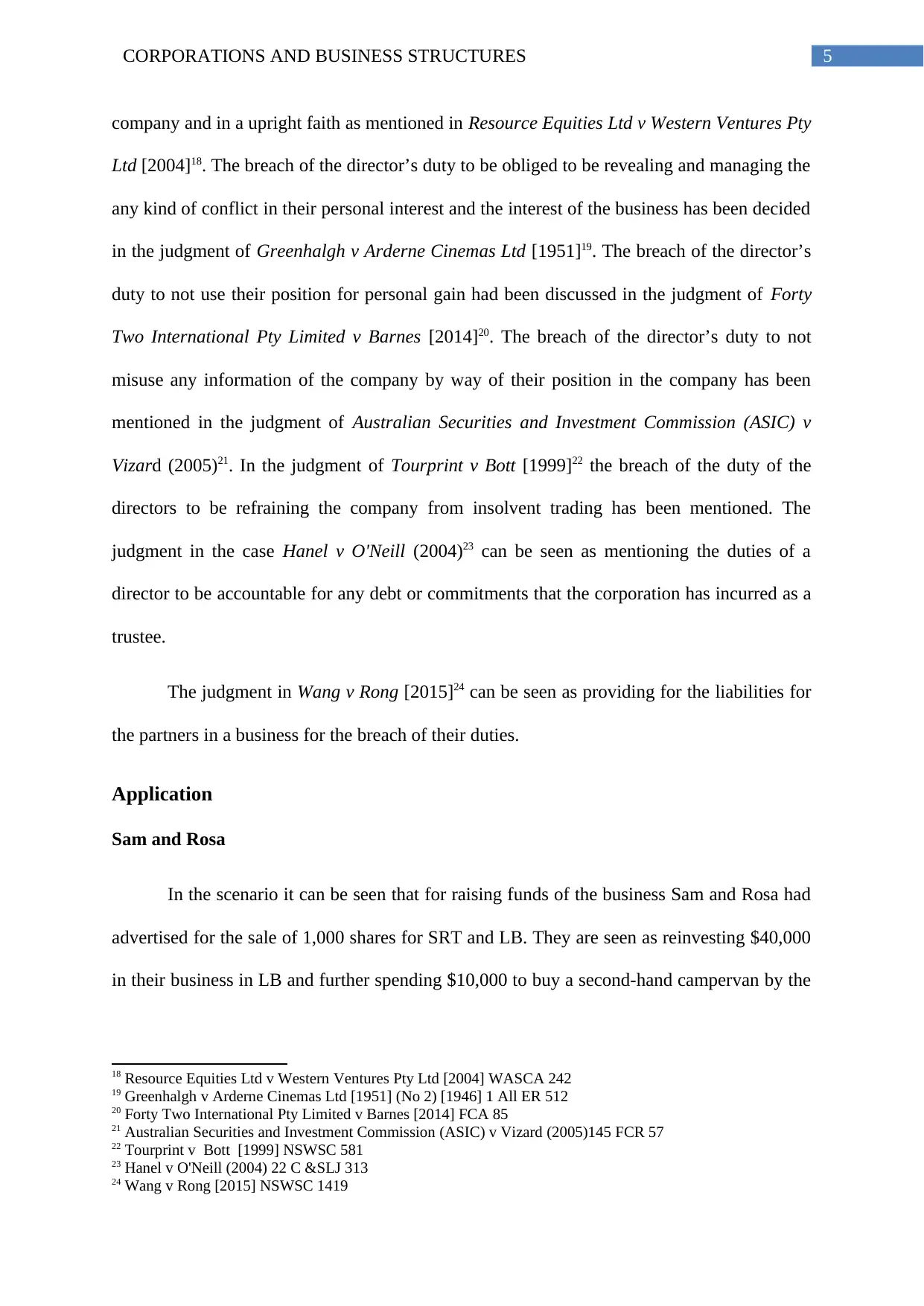
5CORPORATIONS AND BUSINESS STRUCTURES
company and in a upright faith as mentioned in Resource Equities Ltd v Western Ventures Pty
Ltd [2004]18. The breach of the director’s duty to be obliged to be revealing and managing the
any kind of conflict in their personal interest and the interest of the business has been decided
in the judgment of Greenhalgh v Arderne Cinemas Ltd [1951]19. The breach of the director’s
duty to not use their position for personal gain had been discussed in the judgment of Forty
Two International Pty Limited v Barnes [2014]20. The breach of the director’s duty to not
misuse any information of the company by way of their position in the company has been
mentioned in the judgment of Australian Securities and Investment Commission (ASIC) v
Vizard (2005)21. In the judgment of Tourprint v Bott [1999]22 the breach of the duty of the
directors to be refraining the company from insolvent trading has been mentioned. The
judgment in the case Hanel v O'Neill (2004)23 can be seen as mentioning the duties of a
director to be accountable for any debt or commitments that the corporation has incurred as a
trustee.
The judgment in Wang v Rong [2015]24 can be seen as providing for the liabilities for
the partners in a business for the breach of their duties.
Application
Sam and Rosa
In the scenario it can be seen that for raising funds of the business Sam and Rosa had
advertised for the sale of 1,000 shares for SRT and LB. They are seen as reinvesting $40,000
in their business in LB and further spending $10,000 to buy a second-hand campervan by the
18 Resource Equities Ltd v Western Ventures Pty Ltd [2004] WASCA 242
19 Greenhalgh v Arderne Cinemas Ltd [1951] (No 2) [1946] 1 All ER 512
20 Forty Two International Pty Limited v Barnes [2014] FCA 85
21 Australian Securities and Investment Commission (ASIC) v Vizard (2005)145 FCR 57
22 Tourprint v Bott [1999] NSWSC 581
23 Hanel v O'Neill (2004) 22 C &SLJ 313
24 Wang v Rong [2015] NSWSC 1419
company and in a upright faith as mentioned in Resource Equities Ltd v Western Ventures Pty
Ltd [2004]18. The breach of the director’s duty to be obliged to be revealing and managing the
any kind of conflict in their personal interest and the interest of the business has been decided
in the judgment of Greenhalgh v Arderne Cinemas Ltd [1951]19. The breach of the director’s
duty to not use their position for personal gain had been discussed in the judgment of Forty
Two International Pty Limited v Barnes [2014]20. The breach of the director’s duty to not
misuse any information of the company by way of their position in the company has been
mentioned in the judgment of Australian Securities and Investment Commission (ASIC) v
Vizard (2005)21. In the judgment of Tourprint v Bott [1999]22 the breach of the duty of the
directors to be refraining the company from insolvent trading has been mentioned. The
judgment in the case Hanel v O'Neill (2004)23 can be seen as mentioning the duties of a
director to be accountable for any debt or commitments that the corporation has incurred as a
trustee.
The judgment in Wang v Rong [2015]24 can be seen as providing for the liabilities for
the partners in a business for the breach of their duties.
Application
Sam and Rosa
In the scenario it can be seen that for raising funds of the business Sam and Rosa had
advertised for the sale of 1,000 shares for SRT and LB. They are seen as reinvesting $40,000
in their business in LB and further spending $10,000 to buy a second-hand campervan by the
18 Resource Equities Ltd v Western Ventures Pty Ltd [2004] WASCA 242
19 Greenhalgh v Arderne Cinemas Ltd [1951] (No 2) [1946] 1 All ER 512
20 Forty Two International Pty Limited v Barnes [2014] FCA 85
21 Australian Securities and Investment Commission (ASIC) v Vizard (2005)145 FCR 57
22 Tourprint v Bott [1999] NSWSC 581
23 Hanel v O'Neill (2004) 22 C &SLJ 313
24 Wang v Rong [2015] NSWSC 1419
⊘ This is a preview!⊘
Do you want full access?
Subscribe today to unlock all pages.

Trusted by 1+ million students worldwide
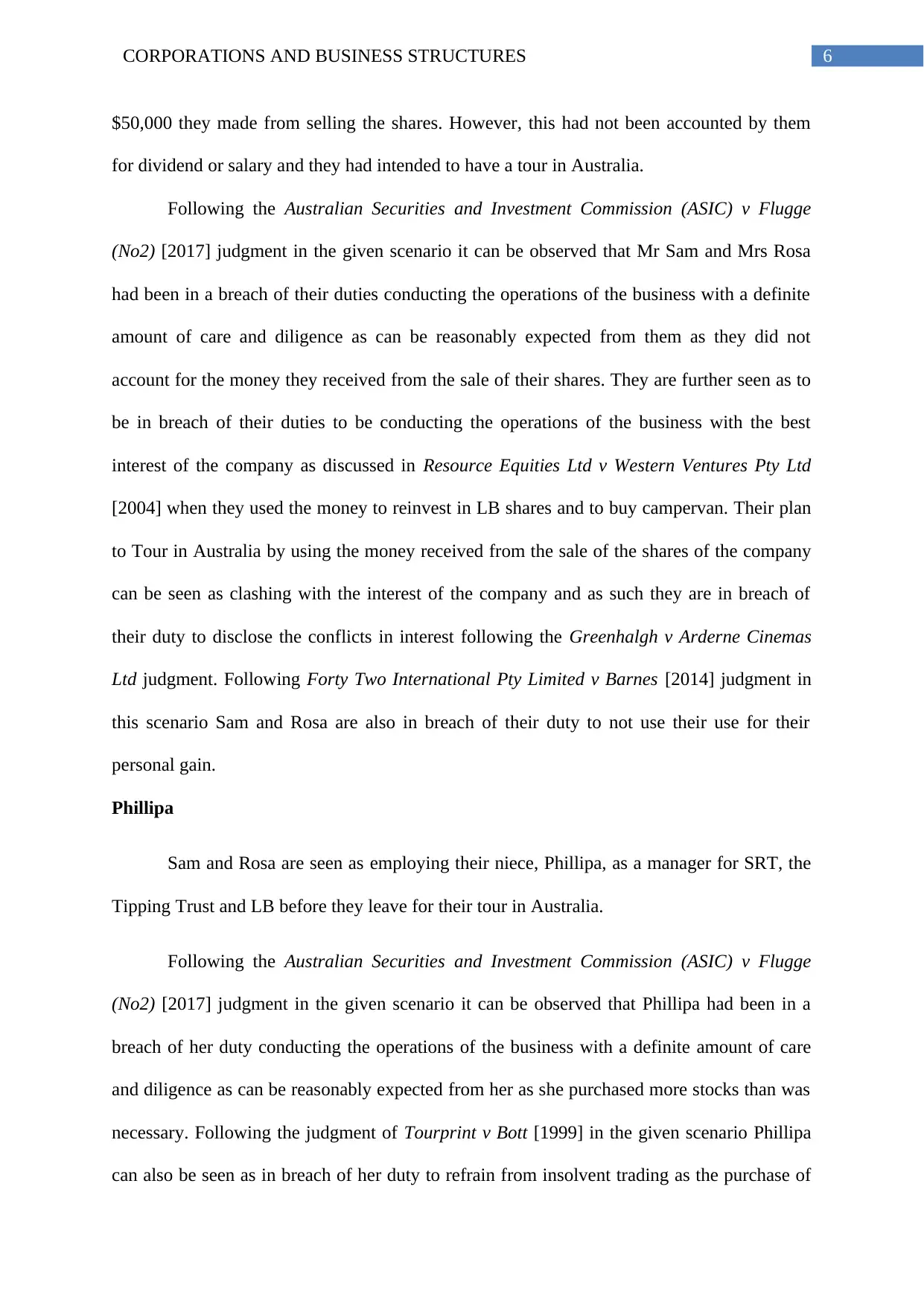
6CORPORATIONS AND BUSINESS STRUCTURES
$50,000 they made from selling the shares. However, this had not been accounted by them
for dividend or salary and they had intended to have a tour in Australia.
Following the Australian Securities and Investment Commission (ASIC) v Flugge
(No2) [2017] judgment in the given scenario it can be observed that Mr Sam and Mrs Rosa
had been in a breach of their duties conducting the operations of the business with a definite
amount of care and diligence as can be reasonably expected from them as they did not
account for the money they received from the sale of their shares. They are further seen as to
be in breach of their duties to be conducting the operations of the business with the best
interest of the company as discussed in Resource Equities Ltd v Western Ventures Pty Ltd
[2004] when they used the money to reinvest in LB shares and to buy campervan. Their plan
to Tour in Australia by using the money received from the sale of the shares of the company
can be seen as clashing with the interest of the company and as such they are in breach of
their duty to disclose the conflicts in interest following the Greenhalgh v Arderne Cinemas
Ltd judgment. Following Forty Two International Pty Limited v Barnes [2014] judgment in
this scenario Sam and Rosa are also in breach of their duty to not use their use for their
personal gain.
Phillipa
Sam and Rosa are seen as employing their niece, Phillipa, as a manager for SRT, the
Tipping Trust and LB before they leave for their tour in Australia.
Following the Australian Securities and Investment Commission (ASIC) v Flugge
(No2) [2017] judgment in the given scenario it can be observed that Phillipa had been in a
breach of her duty conducting the operations of the business with a definite amount of care
and diligence as can be reasonably expected from her as she purchased more stocks than was
necessary. Following the judgment of Tourprint v Bott [1999] in the given scenario Phillipa
can also be seen as in breach of her duty to refrain from insolvent trading as the purchase of
$50,000 they made from selling the shares. However, this had not been accounted by them
for dividend or salary and they had intended to have a tour in Australia.
Following the Australian Securities and Investment Commission (ASIC) v Flugge
(No2) [2017] judgment in the given scenario it can be observed that Mr Sam and Mrs Rosa
had been in a breach of their duties conducting the operations of the business with a definite
amount of care and diligence as can be reasonably expected from them as they did not
account for the money they received from the sale of their shares. They are further seen as to
be in breach of their duties to be conducting the operations of the business with the best
interest of the company as discussed in Resource Equities Ltd v Western Ventures Pty Ltd
[2004] when they used the money to reinvest in LB shares and to buy campervan. Their plan
to Tour in Australia by using the money received from the sale of the shares of the company
can be seen as clashing with the interest of the company and as such they are in breach of
their duty to disclose the conflicts in interest following the Greenhalgh v Arderne Cinemas
Ltd judgment. Following Forty Two International Pty Limited v Barnes [2014] judgment in
this scenario Sam and Rosa are also in breach of their duty to not use their use for their
personal gain.
Phillipa
Sam and Rosa are seen as employing their niece, Phillipa, as a manager for SRT, the
Tipping Trust and LB before they leave for their tour in Australia.
Following the Australian Securities and Investment Commission (ASIC) v Flugge
(No2) [2017] judgment in the given scenario it can be observed that Phillipa had been in a
breach of her duty conducting the operations of the business with a definite amount of care
and diligence as can be reasonably expected from her as she purchased more stocks than was
necessary. Following the judgment of Tourprint v Bott [1999] in the given scenario Phillipa
can also be seen as in breach of her duty to refrain from insolvent trading as the purchase of
Paraphrase This Document
Need a fresh take? Get an instant paraphrase of this document with our AI Paraphraser
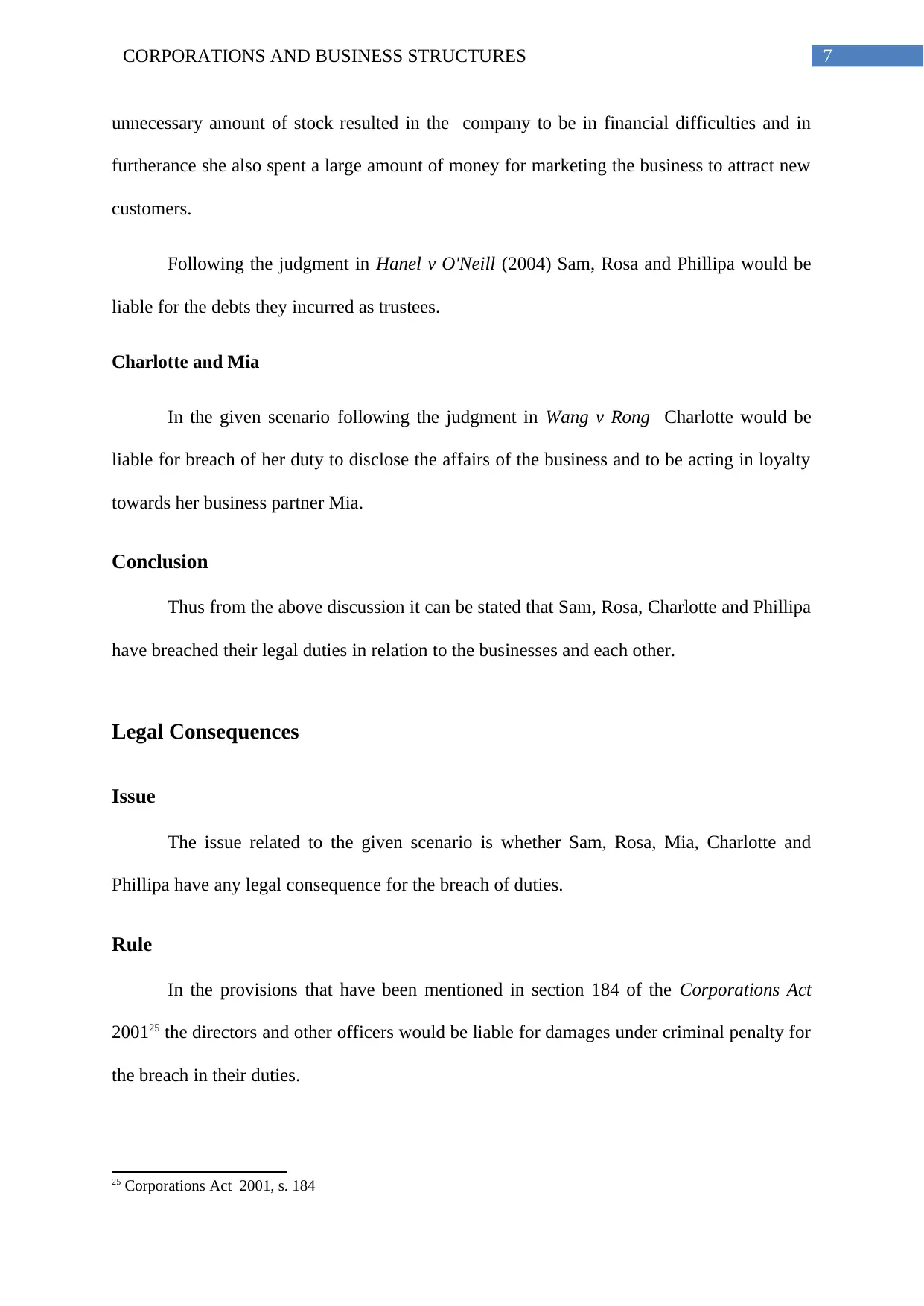
7CORPORATIONS AND BUSINESS STRUCTURES
unnecessary amount of stock resulted in the company to be in financial difficulties and in
furtherance she also spent a large amount of money for marketing the business to attract new
customers.
Following the judgment in Hanel v O'Neill (2004) Sam, Rosa and Phillipa would be
liable for the debts they incurred as trustees.
Charlotte and Mia
In the given scenario following the judgment in Wang v Rong Charlotte would be
liable for breach of her duty to disclose the affairs of the business and to be acting in loyalty
towards her business partner Mia.
Conclusion
Thus from the above discussion it can be stated that Sam, Rosa, Charlotte and Phillipa
have breached their legal duties in relation to the businesses and each other.
Legal Consequences
Issue
The issue related to the given scenario is whether Sam, Rosa, Mia, Charlotte and
Phillipa have any legal consequence for the breach of duties.
Rule
In the provisions that have been mentioned in section 184 of the Corporations Act
200125 the directors and other officers would be liable for damages under criminal penalty for
the breach in their duties.
25 Corporations Act 2001, s. 184
unnecessary amount of stock resulted in the company to be in financial difficulties and in
furtherance she also spent a large amount of money for marketing the business to attract new
customers.
Following the judgment in Hanel v O'Neill (2004) Sam, Rosa and Phillipa would be
liable for the debts they incurred as trustees.
Charlotte and Mia
In the given scenario following the judgment in Wang v Rong Charlotte would be
liable for breach of her duty to disclose the affairs of the business and to be acting in loyalty
towards her business partner Mia.
Conclusion
Thus from the above discussion it can be stated that Sam, Rosa, Charlotte and Phillipa
have breached their legal duties in relation to the businesses and each other.
Legal Consequences
Issue
The issue related to the given scenario is whether Sam, Rosa, Mia, Charlotte and
Phillipa have any legal consequence for the breach of duties.
Rule
In the provisions that have been mentioned in section 184 of the Corporations Act
200125 the directors and other officers would be liable for damages under criminal penalty for
the breach in their duties.
25 Corporations Act 2001, s. 184
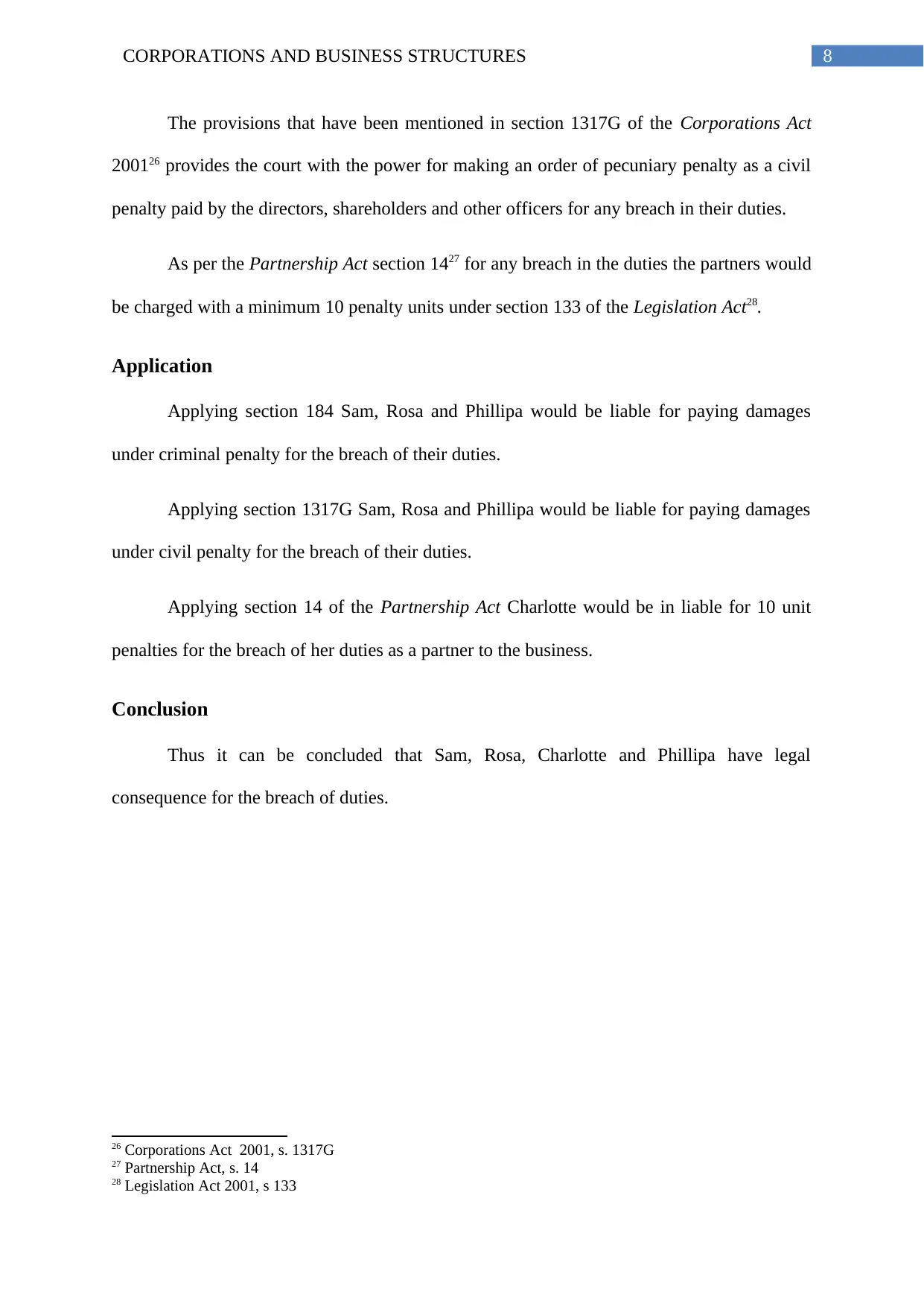
8CORPORATIONS AND BUSINESS STRUCTURES
The provisions that have been mentioned in section 1317G of the Corporations Act
200126 provides the court with the power for making an order of pecuniary penalty as a civil
penalty paid by the directors, shareholders and other officers for any breach in their duties.
As per the Partnership Act section 1427 for any breach in the duties the partners would
be charged with a minimum 10 penalty units under section 133 of the Legislation Act28.
Application
Applying section 184 Sam, Rosa and Phillipa would be liable for paying damages
under criminal penalty for the breach of their duties.
Applying section 1317G Sam, Rosa and Phillipa would be liable for paying damages
under civil penalty for the breach of their duties.
Applying section 14 of the Partnership Act Charlotte would be in liable for 10 unit
penalties for the breach of her duties as a partner to the business.
Conclusion
Thus it can be concluded that Sam, Rosa, Charlotte and Phillipa have legal
consequence for the breach of duties.
26 Corporations Act 2001, s. 1317G
27 Partnership Act, s. 14
28 Legislation Act 2001, s 133
The provisions that have been mentioned in section 1317G of the Corporations Act
200126 provides the court with the power for making an order of pecuniary penalty as a civil
penalty paid by the directors, shareholders and other officers for any breach in their duties.
As per the Partnership Act section 1427 for any breach in the duties the partners would
be charged with a minimum 10 penalty units under section 133 of the Legislation Act28.
Application
Applying section 184 Sam, Rosa and Phillipa would be liable for paying damages
under criminal penalty for the breach of their duties.
Applying section 1317G Sam, Rosa and Phillipa would be liable for paying damages
under civil penalty for the breach of their duties.
Applying section 14 of the Partnership Act Charlotte would be in liable for 10 unit
penalties for the breach of her duties as a partner to the business.
Conclusion
Thus it can be concluded that Sam, Rosa, Charlotte and Phillipa have legal
consequence for the breach of duties.
26 Corporations Act 2001, s. 1317G
27 Partnership Act, s. 14
28 Legislation Act 2001, s 133
⊘ This is a preview!⊘
Do you want full access?
Subscribe today to unlock all pages.

Trusted by 1+ million students worldwide
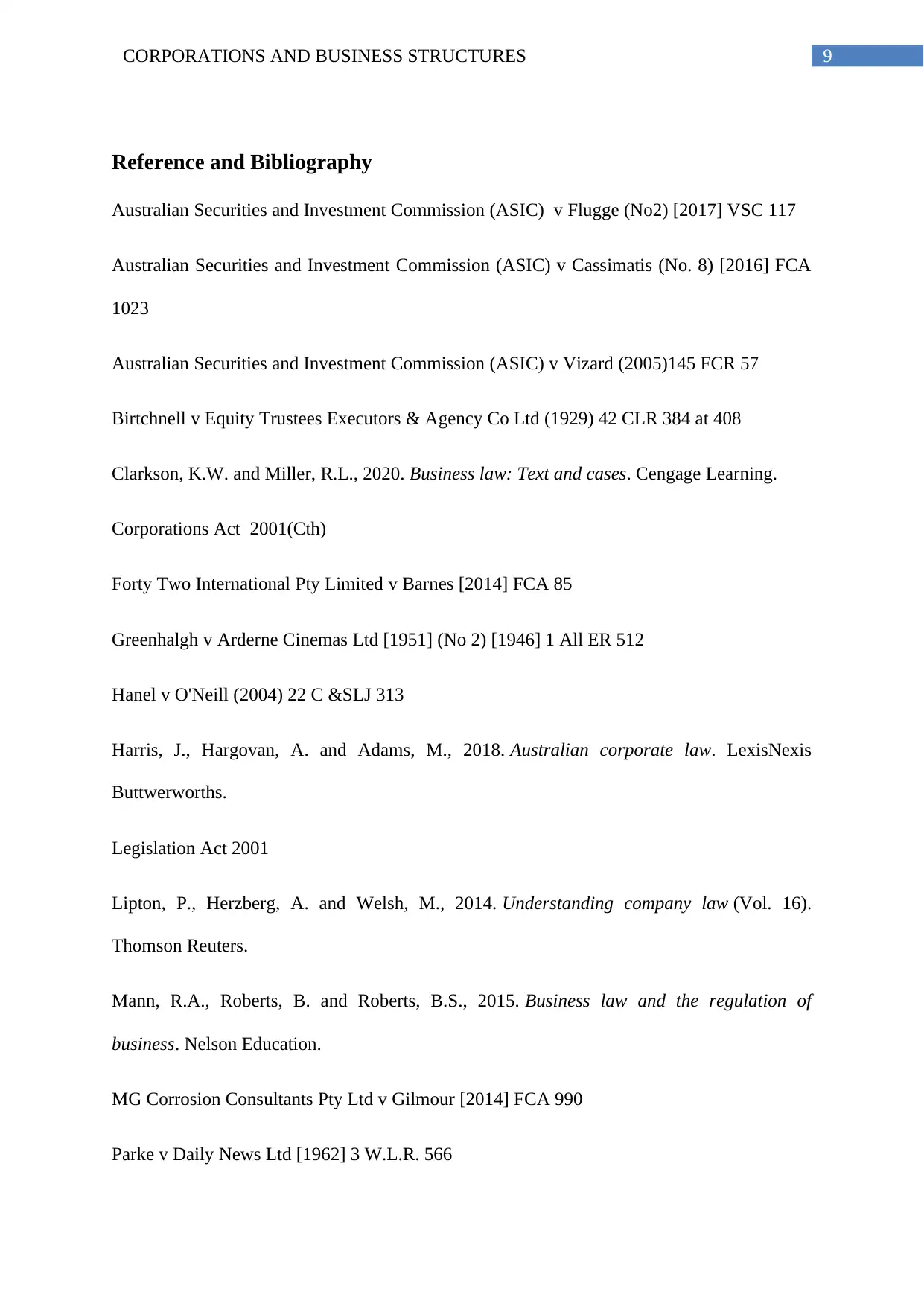
9CORPORATIONS AND BUSINESS STRUCTURES
Reference and Bibliography
Australian Securities and Investment Commission (ASIC) v Flugge (No2) [2017] VSC 117
Australian Securities and Investment Commission (ASIC) v Cassimatis (No. 8) [2016] FCA
1023
Australian Securities and Investment Commission (ASIC) v Vizard (2005)145 FCR 57
Birtchnell v Equity Trustees Executors & Agency Co Ltd (1929) 42 CLR 384 at 408
Clarkson, K.W. and Miller, R.L., 2020. Business law: Text and cases. Cengage Learning.
Corporations Act 2001(Cth)
Forty Two International Pty Limited v Barnes [2014] FCA 85
Greenhalgh v Arderne Cinemas Ltd [1951] (No 2) [1946] 1 All ER 512
Hanel v O'Neill (2004) 22 C &SLJ 313
Harris, J., Hargovan, A. and Adams, M., 2018. Australian corporate law. LexisNexis
Buttwerworths.
Legislation Act 2001
Lipton, P., Herzberg, A. and Welsh, M., 2014. Understanding company law (Vol. 16).
Thomson Reuters.
Mann, R.A., Roberts, B. and Roberts, B.S., 2015. Business law and the regulation of
business. Nelson Education.
MG Corrosion Consultants Pty Ltd v Gilmour [2014] FCA 990
Parke v Daily News Ltd [1962] 3 W.L.R. 566
Reference and Bibliography
Australian Securities and Investment Commission (ASIC) v Flugge (No2) [2017] VSC 117
Australian Securities and Investment Commission (ASIC) v Cassimatis (No. 8) [2016] FCA
1023
Australian Securities and Investment Commission (ASIC) v Vizard (2005)145 FCR 57
Birtchnell v Equity Trustees Executors & Agency Co Ltd (1929) 42 CLR 384 at 408
Clarkson, K.W. and Miller, R.L., 2020. Business law: Text and cases. Cengage Learning.
Corporations Act 2001(Cth)
Forty Two International Pty Limited v Barnes [2014] FCA 85
Greenhalgh v Arderne Cinemas Ltd [1951] (No 2) [1946] 1 All ER 512
Hanel v O'Neill (2004) 22 C &SLJ 313
Harris, J., Hargovan, A. and Adams, M., 2018. Australian corporate law. LexisNexis
Buttwerworths.
Legislation Act 2001
Lipton, P., Herzberg, A. and Welsh, M., 2014. Understanding company law (Vol. 16).
Thomson Reuters.
Mann, R.A., Roberts, B. and Roberts, B.S., 2015. Business law and the regulation of
business. Nelson Education.
MG Corrosion Consultants Pty Ltd v Gilmour [2014] FCA 990
Parke v Daily News Ltd [1962] 3 W.L.R. 566
Paraphrase This Document
Need a fresh take? Get an instant paraphrase of this document with our AI Paraphraser

10CORPORATIONS AND BUSINESS STRUCTURES
Partnership Act 1963 (ACT)
Resource Equities Ltd v Western Ventures Pty Ltd [2004] WASCA 242
Tourprint v Bott [1999] NSWSC 581
Wang v Rong [2015] NSWSC 1419
Partnership Act 1963 (ACT)
Resource Equities Ltd v Western Ventures Pty Ltd [2004] WASCA 242
Tourprint v Bott [1999] NSWSC 581
Wang v Rong [2015] NSWSC 1419
1 out of 11
Related Documents
Your All-in-One AI-Powered Toolkit for Academic Success.
+13062052269
info@desklib.com
Available 24*7 on WhatsApp / Email
![[object Object]](/_next/static/media/star-bottom.7253800d.svg)
Unlock your academic potential
Copyright © 2020–2026 A2Z Services. All Rights Reserved. Developed and managed by ZUCOL.





